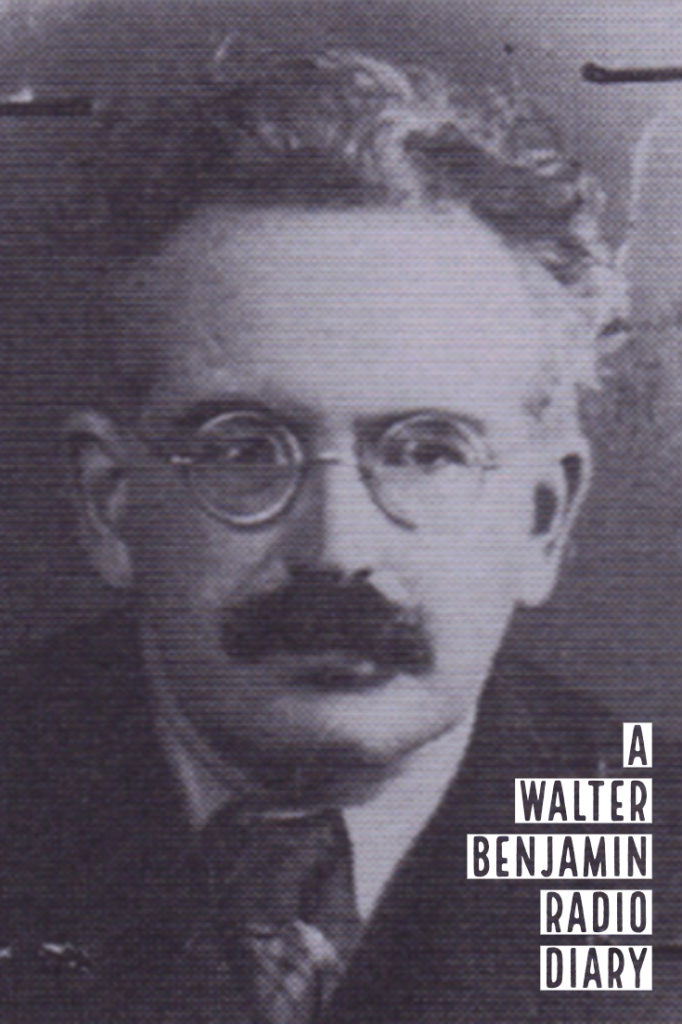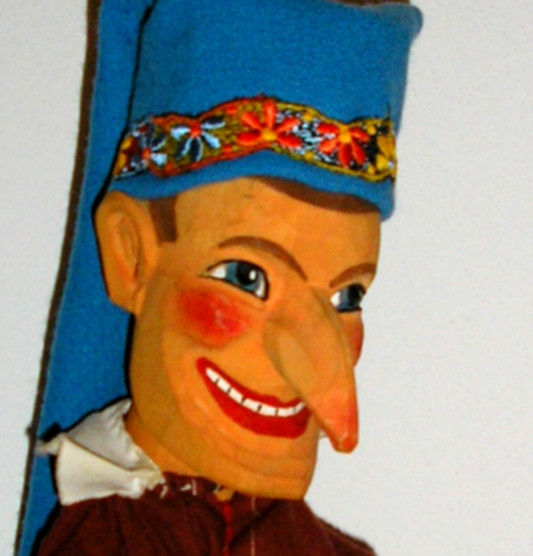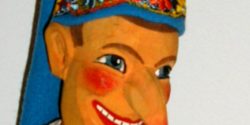
Walter Benjamin broadcast his third “Youth Hour” radio talk with a lament on the state of puppet show entertainment in that famous city.
“Children who want to go to puppet theater don’t have an easy time of it in Berlin,” Benjamin explained. They’ve got better deals in Munich, Paris, and Rome. But one production company still remained, he noted: Kasper Theater, which had its roots in the 18th century puppet character of that name. Kasper was a priggish smartass and the star of a puppet entertainment genre called Kaspertheater, which audiences regarded as synonymous with puppetry in general.

Florian Prosch i.A. der
Piccolo Puppenspiele für die WP
[CC BY-SA 3.0 (http://creativecommons.org/licenses/by-sa/3.0/)]
Before newspapers began publishing comic strips, puppet shows may have been the first entertainment to try to reach both children and adults at the same time. Benjamin reminisced on the Kasper character of the early nineteenth century, who appeared
“not only in plays that were written for him; he also sticks his saucy little nose into all sorts of big, proper theater pieces for adults. He knows he can risk it. In the most terrible tragedies nothing ever happens to him. And when the devil catches up with Faust, he has to let Kasper live, even though he’s no better behaved than his master. He’s just a peculiar chap. Or in his own words: ‘I’ve always been a peculiar fellow. Even as a youngster I always saved my pocket money. And when I had enough, you know what I did with it? I had a tooth pulled’.”
Before going any further with Benjamin’s observations on this subject, I note that KBOO-FM in Portland, Oregon broadcast a fun little puppet theater show for a spell. A 2014 episode featured an interview with a Kasper-like character named “Turner D Century,” candidate for mayor in that city.
“You have some interesting positions that I would like to talk about, ” the host began.
“What are they letting a woman into the radio studio for”? Mr. Century demanded. “This modernization has gone too far.”
Unintimidated, the host pressed on. “Well, Mr. Century, let’s just get into it then. You have a very strong position on the bridges of Portland.”
“We’re going to tear down the bridges once and for all. It was a terrible idea to build them. We’ve wound up connecting the beautiful city with the riff raff, who are free to wander the bridges any time they want and pollute the general environment . . . It’s disgusting, quite frankly.”
“Are you going to ask taxpayer- “
“No, we’re just going to blow them up with dynamite!”
Interestingly, Benjamin managed to sneak some observations about the subject of democracy into his puppet show talk. “A proper puppeteer is a despot,” he explained, “one that makes the Tsar seem like a petty gendarme.” The puppet master writes the shows, does all the art work, dresses up the puppets, and plays all the roles via their own voice. But at the same time, the puppeteer must remain wary of the powers beyond puppet land. “First from the church and [second] the authorities,” Benjamin’s radio essay warned, “because puppets can so easily mock everything without being malicious.”
Benjamin wrapped up his broadcast with summaries of various puppet routines that he found amusing. The last of these was titled “The Discovery of America,” and featured a conversation between Columbus and a “New Worlder.”
“Who goes there?” asks the New Worlder puppet. “What do you want?”
To which the Columbus puppet replies, “I call myself Columbus” and “Simply to discover.”
“And that is how America was discovered,” Benjamin’s description of the exchange summarily ended, “which is now a republic that for a number of reasons I cannot recommend. As soon as this republic gets a king, it will become a monarchy; that’s just the way it is.”
That is how Benjamin concluded his third talk, broadcast on December 7, 1929 in Berlin, less than a year before Adolf Hitler’s Nazi Party won a stunning electoral victory in Germany’s Reichstag (Parliament). And this is how I am ending my latest Walter Benjamin diary entry, just days after United States President Donald Trump went on Twitter to declare that all US companies were “hereby ordered to immediately start looking for an alternative to China . . . ”
This is the third entry in my Walter Benjamin Radio Diary series.
Feature image credit: Wikimedia Commons



